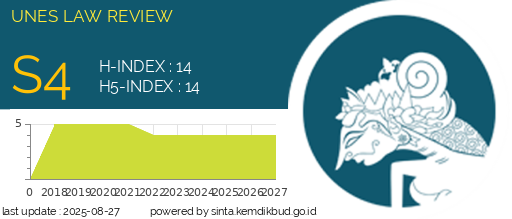Efektifitas Kebijakan Ruang Udara Terbuka terhadap Pembangunan Ekonomi Indonesia
DOI:
https://doi.org/10.31933/unesrev.v6i1.873Keywords:
ASEAN, Open Sky Agreement, IndonesiaAbstract
The ASEAN Open Sky Agreement is one of the multilateral agreements, particularly among ASEAN countries, aimed at enhancing the economy through airspace. The ASEAN Open Sky Agreement is expected to be both a solution and a goal in developing the ASEAN economy, especially to enhance its competitiveness in the international world. This is to ensure that economic development among ASEAN member states can be achieved evenly. The concept of the ASEAN Open Sky Agreement presents significant opportunities, including substantial market access, substantial benefits, increased tourism attractiveness, and flight frequencies. The objective of this research is to analyze the impact and efforts of the Indonesian government in dealing with the implementation of the ASEAN Open Sky Agreement. It is further analyzed using the Legal Effectiveness Theory by Soerjono Soekanto and the Legal Development Theory by Prof. Mochtar Kusumaatmadja. The research methodology utilized is normative juridical. The research design employed in this study is descriptive analysis, and the data is obtained from secondary sources and analyzed qualitatively. From this study, it can be concluded that the impact includes the expansion of flight network coverage, the opening of flight options, and the establishment of broad distribution access through channels provided by partner airlines. Additionally, the agreements within the ASEAN Open Sky Agreement consist of three agreements that regulate air transport services, passenger and cargo services. Undoubtedly, this policy significantly affects implications for airspace sovereignty and limits the authority of the Government in the implementation of the ASEAN Open Sky Agreement.
Downloads
References
Kemala Ratih. “‘Kepastian Hukum Operasional Maskapai Asing Dalam Menjalankan Ruang Udara Terbuka (OPEN SKY POLICY) Dan Dampak Kebijakan Ruang Udara Terbuka Terhadap Pembangunan Ekonomi Indonesia,’” 2019.
Kusuma Hendra. “Mampukah Maskapai Asing Bikin Tiket Pesawat RI Murah,” 2019. https://finance.detik.com/berita-ekonomi-bisnis/d-4575810/mampukah-maskapai-asing-bikin-tiket-pesawat-di-ri-murah.
Prasetyo, Nidya Agustin Beni. “Pengaruh Implementasi ASEAN Open Sky Policy Terhadap Foreign Direct Investment Di Indonesia Pada Tahun 2015-2019”.” Sumatra Journal of International Law Vol. 1, No (2013): Halaman 14.
Saiman, Pakpahan Roby. “Sikap Indonesia National Air Carriers Association(Inaca)Dalam Kebijakan Liberalisasi Layanan Udara ASEAN Open Sky 2015.” Jurnal Online Mahasiswa Fakultas Ilmu Sosial Dan Ilmu Politik Universitas Riau 3 (2016).
Setiyanti, Dina, Ika Riswanti Putranti, and Mohammad Rosyidin. “"Potensi Ancaman ASEAN Open Sky Policy 2015 Terhadap Keamanan Nasional Indonesia”.” Journal of International Relations Vol. 2, No (2016): Halaman 11.
Tampubolon, Heike Larissa, Arif Arif, Chairul Bariah. “"Tinjauan Hukum Internasional Mengenai ASEAN Open Sky Dan Dampaknya Bagi Indonesia”.” Sumatra Journal of International Law Vol. 1, No, no. 2013 (2013): 14.
Tuhumury Rezky Brilyan, Susetyorini Peni, H.M. Kabul Supriyadhie. “Implementasi ASEAN Open Sky Policy Dan Dampaknya Bagi Indonesia.” DIPONEGORO LAW JOURNAL 8 (2019).
“Undang-Undang No. 25 Tahun 2007 Tentang Penanaman Modal,” n.d.
“Undang Undang No 1 Tahun 2009 Tentang Penerbangan,” 2009.
Zainuddin, Ali. Metode Penelitian Hukum. Jakarta: Sinar Grafika, 2009.
Downloads
Published
How to Cite
Issue
Section
License
Hak cipta :
Penulis yang mempublikasikan manuskripnya di jurnal ini menyetujui ketentuan berikut:
- Hak cipta pada setiap artikel adalah milik penulis.
- Penulis mengakui bahwa UNES Law Review berhak menjadi yang pertama menerbitkan dengan lisensi Creative Commons Attribution 4.0 International (Attribution 4.0 International CC BY 4.0) .
- Penulis dapat mengirimkan artikel secara terpisah, mengatur distribusi non-eksklusif manuskrip yang telah diterbitkan dalam jurnal ini ke versi lain (misalnya, dikirim ke repositori institusi penulis, publikasi ke dalam buku, dll.), dengan mengakui bahwa manuskrip telah diterbitkan pertama kali di Jurnal UNES Law Review.



















